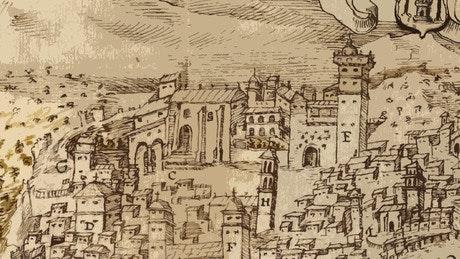
Challenging Assumptions
Our modern, global world is often presented as an unprecedented era of exceptional religious, political, and cultural enlightenment. Certainly we continue to experience tumultuous events and problematic relations, but many of us believe our world exists along a trajectory of human progress. This course is about doubt, questioning, and complications. It opens with the proposition that our present-day world is neither exceptional nor special, but rather is the beneficiary and the slave of history.
About this Course: The Challenges of Co-Existence
Serving as citizen-scholars, students will learn about the positive and negative elements of inter-religious co-existence in Plasencia, Spain, and more importantly, contribute to an international scholarly effort known as the Revealing Cooperation and Conflict Project.
Together, we turn to a historical era that stumbled through the challenges of cultural and religious intermixing and co-existence. From the saved memories of Catholic churchmen, Jewish noble and merchant families, as well as medieval lords and knight clans, students will study and contribute to an effort to revive long lost interactive and cooperative networks of people in Plasencia, Spain. And among the most textured, fascinating elements of our investigation is the history of Spain's Jewish community, or the Sepharad.
For example, students will evaluate the Spanish anti-Jewish pogroms of 1391 that led to the large scale conversion of Jews to Christianity (forced and voluntary). By documenting such incidents and the interaction of noteworthy families, religious organizations, political networks, and economic partnerships, we will reconstruct the quintessential cultural dynamics that underlay the foundation of the Castilian world and impacted the broader European continent.
Within the documents that students transcribe, we will encounter historical persons such as Zanfines Capa, the Jewish chainmail maker, who was a close associate of the Carvajal family of knights. In this specific case, the Catholic Carvajal clan and their compatriots in the cathedral, the Santa Maria clan (formerly the Jewish Ha-Levis), leased church-owned properties to Jewish families (like the chainmail makers) at the expense of their political competitors, the Catholic Estuñiga family (the Counts of Plasencia and Bejar). In this event, competing and overlapping political and religious jurisdictions are revealed as well as vibrant Catholic-Jewish alliances that sought to expel interloping secular lords.
In sum, we will evaluate the lives of Jews, Christians, and Muslims, in a vibrant fifteenth century Spanish community on the edge of incredible events – the consolidation of Spain under Queen Isabel and King Ferdinand, the encounter with the New World, and the defeat of the Islamic Kingdom of Granada Spain and the expulsion of the Jews from Iberia.
